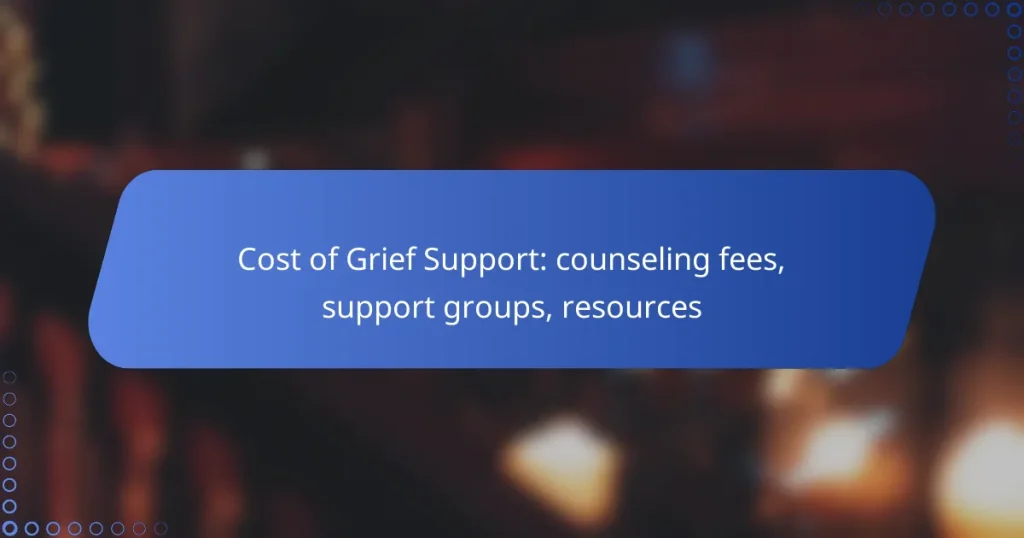Experiencing the funeral process can be overwhelming, but understanding the key steps involved can provide clarity and support during a difficult time. In Canada, this process typically includes initial arrangements, preparation of the deceased, and service planning, along with options for burial or cremation. By familiarizing yourself with these elements, you can make informed decisions that honor your loved one’s memory.
Funeral Package Deals: savings, service inclusions, comparisons
Cost of Grief Support: counseling fees, support groups, resources
Family Involvement: roles, planning together, emotional support
What are the steps in the funeral process in Canada?
The funeral process in Canada typically involves several key steps, including initial arrangements, preparation of the deceased, service planning, and choosing burial or cremation options. Understanding these steps can help families navigate this challenging time more effectively.
Initial arrangements
Initial arrangements begin with selecting a funeral home, which can provide guidance and support throughout the process. Families should consider factors such as location, services offered, and pricing when making this decision.
During this stage, families will also need to discuss the deceased’s wishes, if known, and any cultural or religious considerations that may influence the arrangements. It is advisable to have a clear understanding of the budget to avoid unexpected costs.
Preparation of the deceased
Preparation of the deceased involves several procedures, including embalming, dressing, and cosmetology. Embalming is not always required but may be necessary for open-casket services or if there will be a delay before the burial or cremation.
Funeral homes typically handle these preparations, ensuring that the deceased is treated with dignity and respect. Families can discuss specific requests regarding how their loved one should be presented during the service.
Service planning
Service planning includes selecting the type of service, such as a traditional funeral, memorial service, or celebration of life. Families should consider the preferences of the deceased and the needs of attendees when making this choice.
Key elements to plan include the location, date, time, and any special readings, music, or speakers. It is beneficial to create a timeline for the service to ensure everything runs smoothly on the day.
Burial or cremation options
Families must decide between burial and cremation, each with its own considerations. Burial typically involves purchasing a cemetery plot and a casket, while cremation may require an urn and can be less expensive overall.
Many families choose cremation for its flexibility, allowing for memorial services at a later date. It is essential to discuss these options with the funeral home to understand the associated costs and legal requirements.
Post-funeral support
Post-funeral support is crucial for grieving families and can include counseling services, support groups, or resources for coping with loss. Many funeral homes offer follow-up services to check in on families and provide additional assistance.
Families should not hesitate to seek help from professionals or community resources to navigate their grief. Understanding that grieving is a personal process can help individuals find the support that best suits their needs.
What services do funeral homes offer in Canada?
Funeral homes in Canada provide a range of services to assist families in honoring their loved ones. These services typically include traditional funerals, cremation options, memorial ceremonies, and pre-planning arrangements.
Traditional funeral services
Traditional funeral services often involve a viewing, a formal ceremony, and burial. Families can choose to personalize these services with music, readings, and specific rituals that reflect the deceased’s life and values.
Costs for traditional funerals in Canada can vary widely, generally ranging from CAD 5,000 to CAD 15,000. It’s essential to discuss options and pricing with the funeral director to ensure that the service meets both emotional and financial needs.
Cremation services
Cremation services provide an alternative to burial, allowing families to choose how they wish to handle the remains. Options include direct cremation, where the body is cremated shortly after death, or cremation followed by a memorial service.
The average cost of cremation services in Canada typically falls between CAD 1,500 and CAD 3,500. Families should consider whether they want to keep the ashes, scatter them, or have them interred in a cemetery.
Memorial services
Memorial services are held without the body present and can take place at various locations, including homes, community centers, or places of worship. These services focus on celebrating the life of the deceased through stories, music, and shared memories.
Memorial services can be more flexible in terms of timing and location, often allowing for a more personalized approach. Costs can vary significantly based on venue and arrangements, making it important to plan according to budget and preferences.
Pre-planning services
Pre-planning services enable individuals to arrange their funeral details in advance, alleviating the burden on family members during a difficult time. This can include selecting burial or cremation options, choosing a casket, and specifying service details.
Engaging in pre-planning can help lock in current prices and ensure that personal wishes are honored. Many funeral homes offer packages that cater to different budgets, making it a practical choice for many Canadians.
How to choose a funeral home in Canada?
Choosing a funeral home in Canada involves considering factors such as reputation, services offered, pricing, and location. It’s essential to research and compare options to ensure that the chosen facility meets your needs and preferences during a difficult time.
Reputation and reviews
Start by checking the reputation of funeral homes in your area. Look for online reviews and testimonials from families who have used their services. Websites like Google Reviews and Yelp can provide insights into customer experiences.
Additionally, consider asking for recommendations from friends, family, or local community organizations. A well-regarded funeral home will often have a history of compassionate service and positive feedback.
Service offerings
Funeral homes offer a variety of services, including traditional funerals, cremations, memorial services, and pre-planning options. It is crucial to identify what services you require and ensure the funeral home can accommodate those needs.
Some facilities may also provide additional services such as grief counseling, transportation, and assistance with paperwork. Make a list of your must-have services to help narrow down your choices.
Pricing transparency
Pricing can vary significantly among funeral homes, so it is important to seek transparency in costs. Request a detailed price list that outlines all services and associated fees, including any potential additional charges.
In Canada, funeral homes are required to provide a General Price List (GPL) upon request, which can help you compare costs effectively. Be cautious of homes that are not upfront about their pricing, as this may indicate hidden fees.
Location convenience
Consider the location of the funeral home in relation to your home and the places where family and friends reside. A conveniently located funeral home can ease travel burdens during a challenging time.
Additionally, check if the facility has adequate parking and accessibility features for elderly or disabled guests. A location that is easy to access can make the experience more comfortable for everyone involved.
What are the costs associated with funerals in Canada?
The costs associated with funerals in Canada can vary significantly based on several factors, including location, type of service, and specific arrangements. On average, families can expect to spend anywhere from CAD 5,000 to CAD 15,000 for a complete funeral service.
Average funeral costs
The average cost of a funeral in Canada typically ranges from CAD 7,000 to CAD 10,000. This estimate usually includes basic services, transportation, and a casket. However, prices can be higher in urban areas compared to rural regions.
It’s essential to obtain quotes from multiple funeral homes to ensure you understand the pricing structure and what services are included. Many funeral homes provide itemized lists of costs to help families make informed decisions.
Cremation vs burial costs
Cremation is generally less expensive than traditional burial. The cost of cremation in Canada can range from CAD 2,000 to CAD 5,000, while burial costs can start around CAD 5,000 and go well above CAD 10,000, depending on the casket and plot chosen.
Families should consider their preferences and budget when deciding between cremation and burial. Additionally, some cemeteries may have specific regulations regarding burial plots that could affect overall costs.
Additional service fees
In addition to basic funeral costs, families may encounter additional service fees for items such as obituary notices, memorial services, and transportation of remains. These fees can add several hundred to thousands of dollars to the total expense.
It’s advisable to ask for a comprehensive breakdown of all potential costs when planning a funeral. This transparency can help avoid unexpected expenses during a difficult time.
Payment options
Funeral homes in Canada typically offer various payment options, including pre-payment plans, insurance policies, and financing. Pre-paying can help lock in current prices and alleviate financial stress later.
Families should discuss payment methods with the funeral provider to understand the terms and conditions associated with each option. Some may also accept credit cards or provide payment plans to accommodate different financial situations.
What are the legal requirements for funerals in Canada?
In Canada, legal requirements for funerals vary by province but generally include obtaining a death certificate and ensuring proper handling of the deceased’s remains. Families must also comply with local regulations regarding burial or cremation.
Obtaining a Death Certificate
To proceed with funeral arrangements, a death certificate is essential. This document is typically issued by a physician or coroner and must be filed with the local vital statistics office. The certificate serves as legal proof of death and is necessary for settling the deceased’s estate.
In most provinces, you can apply for a death certificate online, by mail, or in person. Fees for obtaining the certificate can range from CAD 20 to CAD 50, depending on the province.
Handling of Remains
Handling the remains of the deceased must comply with provincial regulations. This includes ensuring that the body is embalmed or cremated within a specified timeframe, which can vary but is often within a few days of death. Families should consult with funeral homes to understand these requirements.
Funeral homes typically assist with the necessary arrangements, including transportation and preparation of the body. It is advisable to confirm that the chosen funeral service provider is licensed and adheres to local laws.
Burial and Cremation Regulations
Burial and cremation practices are subject to local laws, which dictate where and how these processes can occur. For example, many municipalities have designated cemeteries, and families may need to purchase a burial plot. Cremation may require a specific permit, which the funeral home can help obtain.
Costs for burial can vary widely, often ranging from CAD 1,000 to CAD 10,000, depending on the location and services chosen. Cremation is generally less expensive, with costs typically between CAD 500 and CAD 3,000.
Funeral Service Licensing
Funeral service providers in Canada must be licensed to operate legally. Each province has its own licensing board that regulates the industry, ensuring compliance with health and safety standards. Families should verify that their chosen funeral home is properly licensed.
Checking for licenses can often be done through provincial regulatory websites, which may also provide information on consumer rights and complaints processes. This step helps ensure that families receive quality service and adhere to legal standards.



